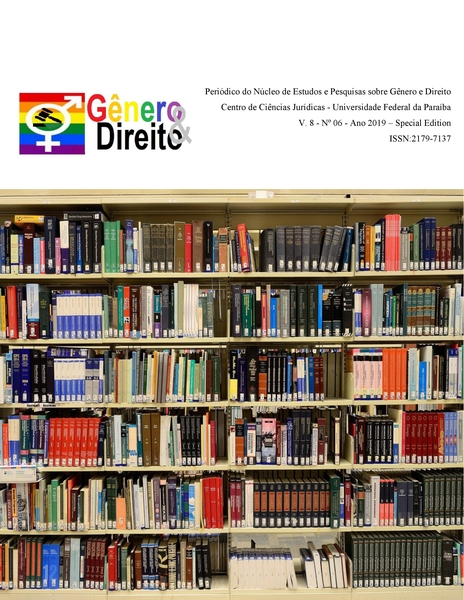RESTRICTION OF THE RIGHT TO THE LIBERTY AND SECURITY OF MINORS ACCORDING TO THE INTERNATIONAL AND NATIONAL LAW (BY THE EXAMPLE OF THE RUSSIAN FEDERATION)
DOI:
https://doi.org/10.22478/ufpb.2179-7137.2019v8n6.49299Palavras-chave:
arrest, detention, rights to liberty and security of person, crime, a minor, European Convention for the Protection of Human Rights and Fundamental Freedoms of 1950, European Court of Human RightsResumo
The article is about the main points of the minors arrest and detention who are suspected in a criminal offense under paragraph 5 (d) of Article 5 of the Convention for the Protection of Human Rights and Fundamental Freedoms of 1950; the legality of the minors arrest and detention, rights and freedoms. The special attention is paid to the study of the pointed legal positions of the European Court of Human Rights. The importance of the study is connected with the fact that the right to the liberty and security is one of the most important rights included in the list of internationally recognized human rights and freedoms. From the point of the generally accepted classification in the law theory and Russian constitutional law, as well as in the theory of international law, the analysing law belongs to the civil (personal) rights. In this regard, the right to the liberty and security can be characterized as a law that has a natural character and it is closely connected with the nature of man.Detention or arrest is the most severe measure; it is applied only on the basis of a court decision which is based only on the results of consideration which is accepted as a result of the court’s learning of the relevant petition submitted by an investigator or inquiry officerDownloads
Não há dados estatísticos.
Referências
The word "security" ("right to liberty and security of person") is used in the translation in official Russian as the concept of “inviolability”; the authors of the paper consider this right within the translation as “security”
Resolution of the Supreme Court Plenum of the Russian Federation dated December 25, 2018 No. 47 “On some issues that the courts have in considering administrative cases related to violation of the conditions of detention for persons in places of detention”, “Rossiyskaya Gazeta”, dated January 10, 2019 No. 2, Bulletin of the Supreme Court of the Russian Federation, February 2019, No. 2
UN Rules for the Protection of Juveniles Deprived of their Liberty (Havana Rules) adopted by the United Nations General Assembly dated December 14, 1990 No. 45/113
The problem of juvenile delinquency has a special place in the work of law enforcement agencies in all developed countries. Effective criminal law measures applied to adolescents can help prevent their offenses and at the same time ensure their correction.
The international legal framework for the criminal law policy regarding juvenile offenders (S. I. Martynova, “Advokat” (“Lawyer”), No. 12, December 2010)
United Nations Standard Minimum Rules for the Administration of Juvenile Justice (Beijing Rules) adopted by UN General Assembly Resolution 40/33 dated November 29, 1985
Generally accepted international principles and standards for the administration of juvenile justice.
Federal Law No. 54 daed March 30, 1998.
Koniarska v. the United Kingdom (dec.)
X. v.Switzerland, Commission Decision dated December 14, 1979
Mubilanzila Mayeka and Kaniki Mitunga v.Belgium, § 100
P. and S. v.Poland, § 147; Ichin and Others v.Ukraine, §39; DG v. Ireland, § 80
Bouamar v.Belgium, § 50
A. and Others v.Bulgaria, §69; DG v. Ireland, § 79
Ichin and Others v.Ukraine, § 39
X. v.Switzerland, Commission Decision dated December 14, 1979
Glotov S.A., Petrenko E.G. Human rights and their protection in the European Court. - Krasnodar: Publ. House “Yug”, 2000, p.113.
Resolution of the European Court of Human Rights on March 23, 2016. The Case “Blokhin v. Russia” (Complaint No. 47152/06, Grand Chambe
Resolution of the Supreme Court Plenum of the Russian Federation dated December 25, 2018 No. 47 “On some issues that the courts have in considering administrative cases related to violation of the conditions of detention for persons in places of detention”, “Rossiyskaya Gazeta”, dated January 10, 2019 No. 2, Bulletin of the Supreme Court of the Russian Federation, February 2019, No. 2
UN Rules for the Protection of Juveniles Deprived of their Liberty (Havana Rules) adopted by the United Nations General Assembly dated December 14, 1990 No. 45/113
The problem of juvenile delinquency has a special place in the work of law enforcement agencies in all developed countries. Effective criminal law measures applied to adolescents can help prevent their offenses and at the same time ensure their correction.
The international legal framework for the criminal law policy regarding juvenile offenders (S. I. Martynova, “Advokat” (“Lawyer”), No. 12, December 2010)
United Nations Standard Minimum Rules for the Administration of Juvenile Justice (Beijing Rules) adopted by UN General Assembly Resolution 40/33 dated November 29, 1985
Generally accepted international principles and standards for the administration of juvenile justice.
Federal Law No. 54 daed March 30, 1998.
Koniarska v. the United Kingdom (dec.)
X. v.Switzerland, Commission Decision dated December 14, 1979
Mubilanzila Mayeka and Kaniki Mitunga v.Belgium, § 100
P. and S. v.Poland, § 147; Ichin and Others v.Ukraine, §39; DG v. Ireland, § 80
Bouamar v.Belgium, § 50
A. and Others v.Bulgaria, §69; DG v. Ireland, § 79
Ichin and Others v.Ukraine, § 39
X. v.Switzerland, Commission Decision dated December 14, 1979
Glotov S.A., Petrenko E.G. Human rights and their protection in the European Court. - Krasnodar: Publ. House “Yug”, 2000, p.113.
Resolution of the European Court of Human Rights on March 23, 2016. The Case “Blokhin v. Russia” (Complaint No. 47152/06, Grand Chambe
Downloads
Publicado
2019-11-26
Como Citar
R. SHAIHUTDINOVA, G. .; Z. SHAMILOVA, G. . RESTRICTION OF THE RIGHT TO THE LIBERTY AND SECURITY OF MINORS ACCORDING TO THE INTERNATIONAL AND NATIONAL LAW (BY THE EXAMPLE OF THE RUSSIAN FEDERATION). Gênero & Direito, [S. l.], v. 8, n. 6, 2019. DOI: 10.22478/ufpb.2179-7137.2019v8n6.49299. Disponível em: https://periodicos.ufpb.br/index.php/ged/article/view/49299. Acesso em: 4 abr. 2025.
Edição
Seção
Seção Livre

